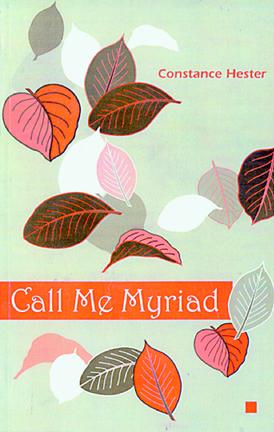This volume from Albuquerque's Wildflower Press includes original pieces, as well as reprints from publications like Fresh Ink, Writing For Our Lives and Verve. The verse in Call Me Myriad is grouped into eight subject headings, such as Tongue, Raspberries and Rain. Each section begins with a ghazal, which I understand is actually pronounced “guzzle.” Where the western world has appropriated such Japanese forms as renga and the interlocking haiku of which renga are composed, the ghazal hails from Persia and is comprised of sher: two line mini-poems unto themselves, each sher ending in the same word.
“Call Me Myriad” precedes the first section and begins with a phrase from Tess Gallagher: “If anyone from the country club asks you if you write poems … .” The completion of this thought which Hester supplies is “tell the truth / about the hard sidewalk of life / and no one will believe you.” Better, then, to tell them that in previous lives you and the questioner were “whores in Mesopotamia” and “that you once sailed with Cortez.”
“Lying Alone in a Cotton Slip” is about being “the strange one in the attic,” who is “drafting poems my family won't read,” while aunts, uncles and cousins eat ice cream downstairs. “Ground Squirrels” toys with “nuts” and “feeling a little squirrelly” in the context of a need to produce poetry. It appears to put forth the proposition that those among us who are compelled to compose verse are a bit out of our trees. (Hence the title.)
“Triangle” consists of a visual pyramid built of words. It nicely encapsulates the smoldering frustration a woman experiences in the relationship triangle of the accommodating woman a man perceives his mate to be, and the woman his mate actually is.
“My Sister's Cancer is Back” is self-explanatory. “Native Dancers” suggests an alternate history in which Native Americans might have conquered Europe and how today they would derive entertainment from watching white folks perform dances and ceremonies in an attempt to preserve their history and cultural identity. “In the Clutches of Roses” echoes fairy tale imagery and the sting of real life infidelity, in which “a young army officer with chest medals” conducts an affair with a woman in an English garden. “Roses” ends with the adulterous soldier snared in the thorny roses to die.
There is much more in the range of writing collected here, the structure-within-structure ghazals that introduce each of the eight sections acting as a framework for the book as a whole. While Call Me Myriad seems light and fast to read, these compositions evoke enough images, colors, smells, events and, most importantly, emotions (including some fair amount of pain) to leave a reader with the lingering imprint of an intelligent, talented Albuquerque transplant named Constance Hester.









